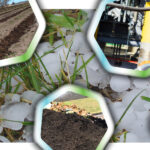
Nora Goldstein
BioCycle September 2017
The catastrophic weather over the past week in southeast Texas, and the scale of the resulting tragedy and devastation, is tremendously sad. Also sad is the fact the occurrence of a storm with this level of intensity, moisture and duration was not unexpected. “It has become increasingly hard to deny that the conditions that helped make these storms so devastating — warmer-than-usual ocean waters, warmer air — are going to be more common features of life on Earth thanks to global warming,” notes an email I just received from Climate Solutions in Seattle. “Houston itself has seen four 100-year flooding events since the spring of 2015. Events such as these should only heighten our collective sense of urgency to stop making things worse by continuing our reliance on fossil fuels and the carbon pollution they produce.”
What also is not unexpected is how a devastating storm in this particular part of the U.S. wreaks havoc not just on that region’s, but the entire U.S. economy. A New York Times article on August 29, “Harvey’s Toll on Energy Industry Shows a Texas Vulnerability,” states: “For years, much of the nation’s refinery capacity and chemical production have been concentrated along the swamps and narrow inlets of the Gulf of Mexico, risking devastation in a monster storm. The pounding being endured by coastal Texas will probably be the biggest test of that risk so far, and energy experts say it raises questions about the area’s role as a hub for such crucial and environmentally sensitive industries.”
And this bit of irony in the NYT article: “The damage underscores how the companies often held responsible for contributing to global warming could increasingly suffer from its effects.” When I read that last statement, so many “no, duh” thoughts started zooming around in my head. But here’s the deal. This is not a time for unproductive “I told you so’s”, finger pointing and blame games. Instead, Ladies and Gentlemen, it’s Show Time!
Now, more than ever, it’s Show Time for all sectors of the economy that have invented and implemented climate resilient solutions — sectors that include renewable energy, green infrastructure, organics recycling, healthy soils, low carbon fuels and public transit — to join forces as an integrated package of products and services for communities. It’s Show Time for more widespread adoption of the policies and laws that have nurtured these climate resilient solution providers so that all communities, rural and urban, can dramatically reduce their vulnerability to catastrophic climate events.
Most importantly, it is time to stop politicizing climate realities. The cool part about climate resilient solutions is that they are job and opportunity generators, not destroyers. Another cool thing, as the BioCycle Community well knows, is that one good solution begets another. In organics recycling terms, for example, composting and digesting organic waste streams dramatically reduce methane emissions. Amending soil with the compost produced improves storm water infiltration and drought resilience and sequesters carbon. Vehicle fuel produced from upgraded biogas from AD facilities has one of the lowest carbon intensities of any renewable fuel.
Finally, no one needs to figure any of this out alone. All of these climate resilient economic sectors have robust networks and training tools, including BioCycle and BioCycle Conferences — join us at BioCycle REFOR17 in Portland, Oregon, October 16 — 19). The next frontier is integrating these diverse solutions. Individually, they are all good. Integrated, they pack the power to mitigate climate impacts — including the ability to bring essential services back on line more rapidly.
Ladies and Gentlemen: Show Time.









